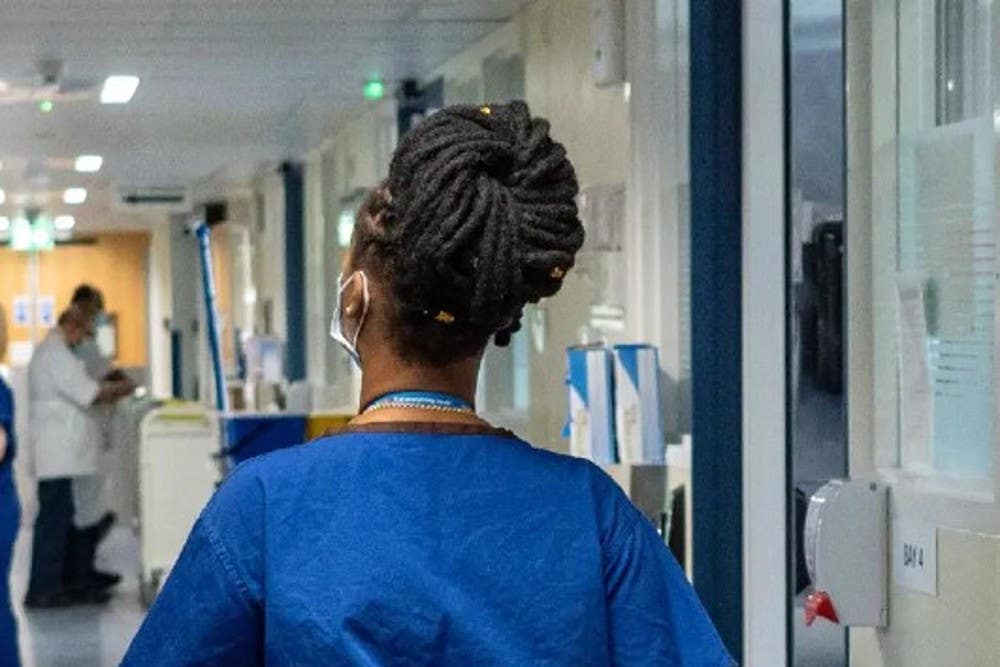NHS ‘structural racism’ saw ethnic minority staff not heard on PPE, inquiry told
There are ‘stark’ differences in how black and ethnic minority patients and workers were treated, the UK Covid-19 Inquiry heard.

Your support helps us to tell the story
From reproductive rights to climate change to Big Tech, The Independent is on the ground when the story is developing. Whether it's investigating the financials of Elon Musk's pro-Trump PAC or producing our latest documentary, 'The A Word', which shines a light on the American women fighting for reproductive rights, we know how important it is to parse out the facts from the messaging.
At such a critical moment in US history, we need reporters on the ground. Your donation allows us to keep sending journalists to speak to both sides of the story.
The Independent is trusted by Americans across the entire political spectrum. And unlike many other quality news outlets, we choose not to lock Americans out of our reporting and analysis with paywalls. We believe quality journalism should be available to everyone, paid for by those who can afford it.
Your support makes all the difference.‘Structural racism’ within the NHS saw some black and minority ethnic healthcare workers not being listened to, believed or responded to when they raised concerns about issues including ill-fitting face masks in the pandemic, the Covid inquiry has been told.
There was a feeling of powerlessness on hearing about such problems for some staff who were encouraged to work anyway, Federation of Ethnic Minority Healthcare Organisations (Femho) general secretary Ade Adeyemi said.
He told Friday’s hearing there are “stark” differences in how black and ethnic minority patients and workers were treated in the NHS, and indicated a lack of consideration as to how well face masks might fit on someone with a beard or wearing a headscarf due to their religion.
There's a kind of toxic mess here. I described earlier about the power imbalances which mean most of our members didn't feel able to raise those concerns and the brave ones that did weren't listened to
Mr Adeyemi said: “It was difficult to find the right PPE (personal protective equipment) and this gave us a sense of the lack of, again, the belief of what we were saying.
“That the system can pick up signals and noise and disruption in other areas but when there’s noise and disruption of black and Asian ethnic minority workers, it’s not heard and it’s not responded to immediately.”
Asked by inquiry counsel Andrew O’Connor KC if what he was describing could be considered “structural racism”, Mr Adeyemi replied: “If it quacks like a duck and it walks like a duck, it’s a duck.”
Mr Adeyemi said the organisation had been contacted by healthcare workers about the face fit test – to make sure that PPE fits securely – not being done properly.
He said: “We have so many examples of again just WhatsApp messages, and it’s so traumatic to receive them and feel powerless because we’re hearing those things, we’re hearing the face fit test isn’t done properly.
“Some ward managers aren’t seeing the results that it’s not fitting well and they’re actually still being encouraged to work.
The evidence is very clear, both as patients, as service users of the NHS and social care system, and also as professionals ... the difference that we see with our white counterparts is stark and it's been existing for many years
“And you know, there’s a kind of toxic mess here.
“I described earlier about the power imbalances which mean most of our members didn’t feel able to raise those concerns and the brave ones that did weren’t listened to.
“But it was a palpable thing that we said ‘these things don’t always fit us well, there are some people who need extra appendages so it can go around the hijab etc’. Not listened to, not believed, not responded to.”
He added: “The evidence is very clear, both as patients, as service users of the NHS and social care system, and also as professionals both in a professional sense in a work capacity, the difference that we see with our white counterparts is stark and it’s been existing for many years.”
It is these differences that led to the formation of Femho around a year before the pandemic, he said, so there can be shared knowledge to try to address a problem that “hasn’t been meaningfully, substantively addressed”.